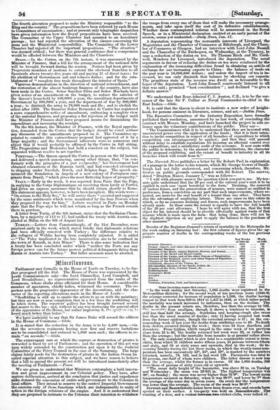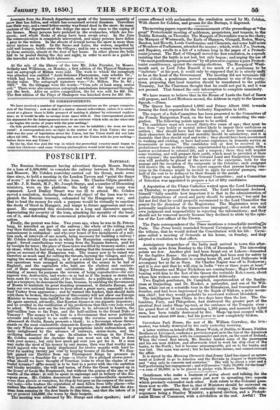_aliorttlgutnito.
Parliament met formally in the House of Lords on Tuesday, to be fur- ther prorogued till the 31st. The House of Peers was represented by the Lords Commissioners only—the Lord Chancellor, Lord Campbell, and Lord Breadalbane ; no representative appeared from the ranks of the Ciommons, whose clerks alone officiated for their House. A considerable -number of spectators, chiefly ladies, witnessed the ceremony. The re- porters note the progressive appearance of the decorations, and the cha- racter of the reporting alterations made in the House of Lords-
• " Scaffolding is still up to enable the artists to go on with the paintings; but they are now so near completion that in a few days the scaffolding will be taken down. The reporters gallery has been brought forward several feet nearer to the bar; and, without in any way destroying the general effect of the appearance of the House, but rather improving it; t%e c.x. be • heard much better than before.' • •
••.
• Vveliaret7utherity to say that Sir James Duke will second the address in the House of Commons.—Globe.
It is stated that the reduction in the Army is to be 3,400 men,—viz. that the seventeen regiments having now first and reserve battalions are to be consolidated and reduced to 1,000 men each; the officers to re- main " en seconde."—Globe.
The extravagant rate at which the capture or destruction of pirates is rewarded is fixed by act of Parliament ; and the operation of this act was very widely extended by the construction put upon it by the Judicial Committee of the Privy Council in the ease of the Semarang. The large claims lately made for the destruction of pirates in the Indian Ocean ha called especial attention to this subject, and we have reason to believe that a bill to amend the present act will be introduced immediately after the meeting of Parliament.—Trines.
We are given to understand that Ministers contemplate a bold innova- tion and great improvement in our Colonial policy. They have, after mature deliberation, arrived at the conclusion that justice and expediency alike demand the concession of entire self-government to the Colonies in local affairs. They intend to reserve to the central Imperial Government the exercise only of those functions which are indispensable to unity of action in the foreign relations of the empire. And it is understood that they are prepared to intimate to the Colonies their intention to withdraw the troops from every one of them that will make the necessarry arrange- ments, and take upon itself the cost of its defensive establishments. Whether these contemplated reforms will be announced in the Royal Speech, or in a Ministerial declaration emitted at an early period of the session, seems yet undecided—Daily News, Jan. 17.
A deputation representing the mercantile interests of Liverpool, the Magistrates and the Chamber of Commerce at Edinburgh, and the Cham- ber of Commerce at Glasgow, had an interview with Lord John Russell and the Chancellor of the Exchequer, on Wednesday, at the Treasury, to urge a reduction of the duties on tea. Sir Thomas Birch and Mr. ard- well, Members for Liverpool, introduced the deputation. The usual arguments in favour of reducing the duties on tea were reinforced by the explanation of the increasing difficulties found in obtaining an article of exchange for our increasing exports to China : the balance of trade on the past year is 10,000,000 dollars ; and unless the import of tea is in- creased, we can only diminish that balance by checking our exports. The propitious state of the revenue was dwelt on as favourable to the hopes of the deputation. Lord John Russell courteously 'listened to all that was said ; promised "best consideration" ; and declined "to give a definite answer."
We understand that Rear-Admiral C. J. Austea,'C.B., into be the suc- cessor of the late Sir F. Collier as Naval Commander-in-chief in the East Indies.—Globe.
It is said that the Queen is about to institute a new order of knight- hood, for persons eminent in literature, science, and art.—Dublin Press.
The Executive Committee of the Industry Exposition have formally published their resolution, announced by us last week, of rescinding the contract with Messrs. Munday, and have launched the project in sole re- liance upon the voluntary contributions of the public. They say- " The Commissioners wish it to be understood that they are invested-with unrestricted power over the application of the funds ; that it is their inten- tion to invite competition in respect of all branches of expenditure to which competition can advantageously be applied; and that they will proceed without delay to establish regulations for insuring an effectual control over the expenditure, and a satisfactory audit of the accounts. It now rests with the public to determine, by the amount of their contributions, the character of the proposed exhibition, and the extent of benefit to industry in all its branches which will result from it."
The Norwich News publishes a letter by Sir Robert Peel in explanation of a passage in the letter to his tenants, which Mr. George Gower of Small- burgh had not fully understood, and concerning which, therefore, Mr. Gower on public grounds oorresponded with Sir Robert. The answer, dated " Drayton Manor, January 7," was as follows- " I will with pleasure answer the question which-you put to me. -My ten- ants quite understand that the 20 per cent of the current year's rent is to be applied in each case most beneficial to the farm.' Draining, the removal of useless fences, and the preservation of manure, were named .as entitledi t preference, from a conviction on my part that such improvements, where re- quired, are more for the real benefit of a tenant than any other. They have also the advantage of employing labour. There are cases on this estate in which, so far as concerns draining and fences, such improvements have been already made. In those cases the tenant is equally to have the full benefit of the 20 per cent allowance. I hope he will agree with me, that the first object for Ms interest should be to provide effectually against waste of that manure which is made upon the farm : that be1'ng done, there will not be the slightest objection on my-part to apply the ce the purchase of other manures.'
Results of the Registrar-General's return of mortality in the Metropolis for the week ending on Saturday last : the first column of figures gives the ag- gregate number of deaths in the corresponding weeks of the ten previous years—
Ten Weeks of 1889-49.
Zymotic Diseases 2234 Dropsy, Cancer, and other diseases of uncertain or variable seat 299 Tubercular Diseases 1878 ....
Diseases of the Brain, Spinal Marrow, Nerves, and Senses 1318 Diseases of the Heart and Blood-vessels 378 Diseases of the Lungs, and of the other Organs of Respiration 2836 Diseases of the Stomach, Liver, and other Organs of Digestion 607
Diseases of the Kidneys, .te as Childbirth, diseases of the Uterus, ‘te 101 Rheumatism, diseases of the Bones, Joints, Ile 80 Diseases of the Skin, Cellular Tissue, &e 10 kialfOrmations 26 Premature Birth 221 Atrophy 131 Age 804 Sudden 125 Violence, Privation, Cold, and Intemperance 234 Week. of 1830.
181
Total (Including unspecified causes) 11553 1065
" In the week ending last Saturday, 1,065 deaths were registered in the Metropolitan districts; for the second week of ten previous years (1840-9) the average corrected for increase of population is 1,260, the deaths having ranged in that week from 920 in 1844 to 1,457 in 1848, at which latter period the mortality was much increased by influenza, then on the decline. The deaths in the present return are, therefore, less than the average by 195. 11`u riw‘r1.044-7 from smallpox, though it shows a tendency to increase, is still less than half the average. Scarlatina and hooping-cough also cause less than the usual number of deaths ; only 11 having occurred last week from the former epidemic, though the corrected average is 37; in the cor- responding week of last year the deaths from scarlatina rose to 63. No death from cholera occurred during the week ; there were 24 from diarrhoea and dysentery. Prom typhus, which ranged in the same week of ten previous years from 22 to 83, the deaths returned last week were 33, or rather less than the average ; but the mortality from measles is at present rather above it. The only complaint which is now fatal to a considerable extent is bron- chitis, from which 21 children under fifteen years, 31 persons between fifteen and sixty, and 64 at sixty years and upwards, died in the week ; its in- creasing fatality during the last three weeks, in which the weekly mean ten perature has been successively 33°, 35°, and 30°, is marked by the numbers returned, namely, 78, 103, and in last week 120. Pneumonia was fatal to 83 persons, one-half of whom were children. The latter disease is now less than the average, whilst the former is in excess. Of the 1,065 deaths, 303 were those of persons of sixty years old or upwards. "The mean daily height of the barometer, was above 30 in. on Tuesday and Wednesday ; the mean was 29.821 in. The highest temperature was 38°, on Sunday ; the mean was never higher than 31-8°. The lowest mean temperature occurred on Saturday, when it was 28.7°, and lower by 7° than the average of the same day in seven years. On every day the temperature was lower than the average. The mean of the week was 30.30." Derwent and Bassenthwaite Lakes have been frozen over, and crowds have sported on their surface. A tea-patty was held on Bassenthwaite. The roasting of a deer, and a contest botweea-two- cricket-clubs, were talked of. Accounts from the French departments speak of the immense quantity of snow that has fallen, and which has occasioned several disasters. Travellers lose their way, and a rural letter-carrier was found dead in the snow. In many cantons of the department of the Ariege the snow has risen to the coping of the houses. Many persons have perished in the avalanches, which are fre- quent; and whole flocks of sheep have been swept away. In the Jura the communication is completely interrupted, and many persons have fallen a prey to the wolves. In the streets of several towns the snow is more than three metres in depth. In the Saone and Loire, the wolves, impelled by cold and hunger, boldly enter the villages ; and in one a woman was devoured by these animals, almost at the door of her house. In other places the bells had to be pealed during the day and night, in order to serve as a guide to the -traveller and to the field-labourer.
At the sale of the h of the late Mr. John Poynder, by Messrs.
Sotheby and Wilkinson, on Monday, a first edition of the Plays of Shakspere and an autograph of Milton were sold. The work to which the autograph was attached was entitled "Arad Menses Phrenomena, cum scholiis Gr.," which had been in Milton's possession, and which in itself was of no - ticular value. The autograph signature was—" Jo. Milton. Pre 24. . ; 1631." On the titlepege were the words—" Cum sole et land semp. aratus erit." There were also numerous autograph annotations interspersed through- out the book.. After an active commppeetition, the lot was sold for 401. 108. The'first edition of the Plays of Shakapere was knocked down for 351. 108.



























 Previous page
Previous page